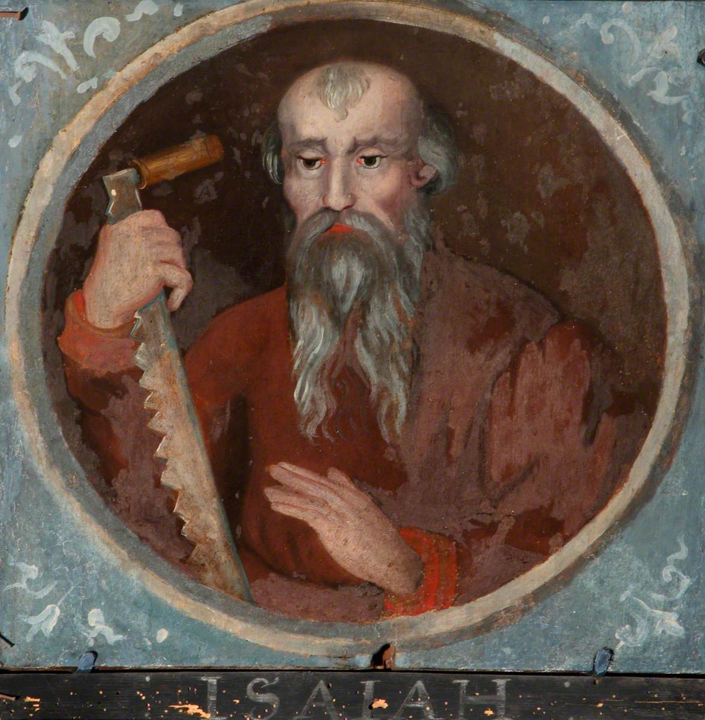The prophet I have been thinking about this week is Isaiah. The image is from the National Trust Chastleton House collection. It was painted around 1610-1615 and the artist is, as far as I can tell, unknown.
Isaiah lived about 200 years before Ezekiel, who I spoke about last week. We can date Isaiah very easily because in the very first verse of his book of writings states that he had his visions in “the days of Uzziah, Jotham, Ahaz and Hezekiah”, and he also says that he was called in the year that King Uzziah died. We know as a historical fact that Uzziah died 739 years before Jesus and Hezekiah died 687 years before Jesus, so Isaiah was at work as a prophet for about 45 years.
Uzziah had been a wonderful king – the best since King Solomon (who you might recall was known for his wisdom), but those who followed did not match Uzziah, so in his time as a prophet Isaiah saw crisis after crisis and sought to speak God’s word and wisdom into a very tense political time.
If you read my piece last week you might recall that I said that prophets weren’t there to tell the future. They were there to face people with what God was saying in their time and place. Their job was (and is) to remind the people what it means to belong to God: to be God’s people. One word for prophet in Hebrew is “Nabi” which means “one called”. This reminds us that prophets didn’t choose their role: they were (and are) called to it. It is often a difficult and unpopular task, for they have to be blunt about God’s ways in a community that does not always want to hear.
Isaiah’s central message is that the people have lost what living their faith means. They are good at keeping the religious feasts, but they do not live their faith out in terms of justice and compassion. At the start of his writings, he says this: “the ox and donkey know their master…but Israel does not know, my people do not understand.” And then he tells them what they must do: “learn to do good, seek justice, rescue the oppressed, defend the orphan, plead for the widow.”
The words of Isaiah I’ve been focusing on this are about a vineyard and they come in the form of a song that Isaiah most likely sung at the autumn vineyard festival. This was a traditional time of joy and merry making. Isaiah’s song starts really lovely, about a vineyard that is well loved and well placed and well cared for, but that does not produce the expected sweet grapes. Instead, it produces wild, soar grapes. The song then sings of how angry the one who loved the vineyard is and say they will destroy it. I don’t image the song went down well at the party! You can look it up in Isaiah chapter 5, verses 1-7.
Whenever vineyards are mentioned in the bible something really important is being said about God: vineyards always tell us about God’s long-term commitment because, as most of us round here will know, vines take a long time to grow. Vines in the bible are always a reminder that God sticks around. This song is about the faithfulness of God and the unfaithfulness of the people of God, for the vine is the people and the vine keeper is God.
I don’t do this often, but here is a bit of Hebrew – the language Isaiah would have been singing in – because it’s important to know this to understand the song: The song says that “justice” (Hebrew: “mishpat”) has been replaced by “bloodshed” (Hebrew: “mispah”) and “righteousness” (Hebrew: “tsedaqah”) has been replaced by “a cry” (Hebrew:“tse’aqah”). You’ll see the words are very similar in Hebrew, but so very different! Perhaps Isaiah is saying how easily you have mixed them up. God desires justice and righteousness – the people make bloodshed and crying.
I can’t help thinking there are words here that we need to hear. The difference between what God demands and how we might live. How justice in our day is replaced by bloodshed and how righteousness becomes crying. And if it is not us that do these things surely the calling on us is to be the “Nabi” the ones called to blunt on behalf of God?
For there are things that are being said and done in this day that are worrying and dangerous. Words and ways that put consumerism and convenience above the desperate needs of our planet. Words and ways that are saying that some members of our society (and some of our families) are the “problem”. And there are words about the failing of multiculturalism and the threat of immigrants to the ways of this country. These words are deeply dangerous. We need to be the “Nabi”, ones called by God to say the ways of God are not the ways of those in power.
There are questions that face us as a nation. There are questions that face our planet. We can stick our heads in the sand and hope it will all go away. We can turn on those we have been told are the problem. We can live as if it’s not really as serious as it seems to be. Or we can invest, with God, in the future by living now to tend and love God’s vineyard – the people we share this planet with. And if we dare, we can challenge those who would destroy it. Prophets speak out in times of crisis. We have a crisis: we cannot keep quiet!
If you want to talk about anything here or anything at all, please do send a message and I’ll be in touch as soon as I can.
Rev Anne

